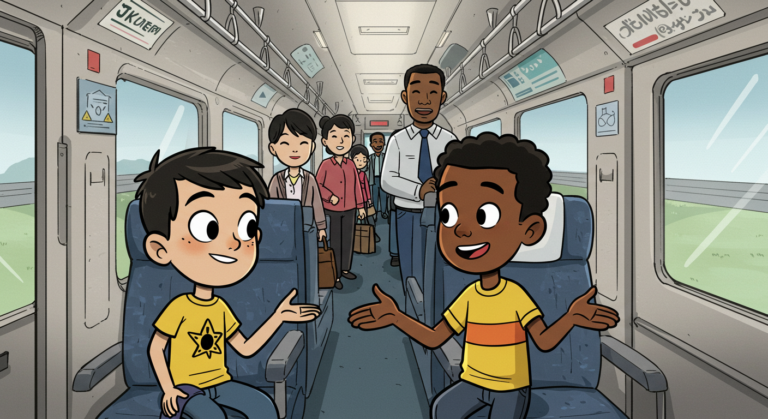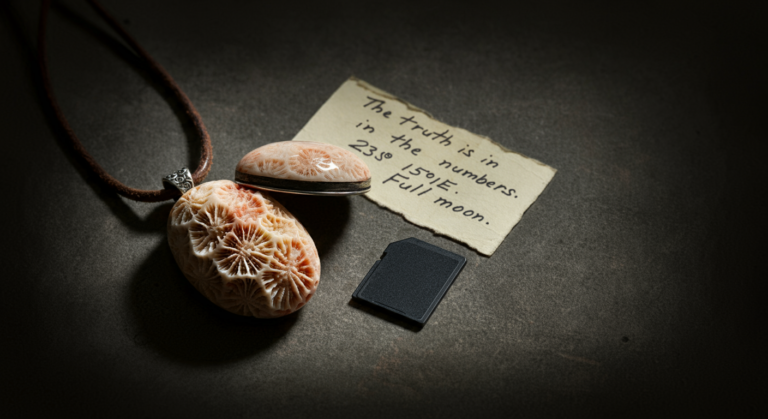The Busan Sharks Go to Seoul
Native-Level Story
Today×意味:
今日。
文法:
- 名詞です。
- 特定の日を指します。
例:
Today is Monday.
今日は月曜日です。
I am happy today.
私は今日幸せです。 was the day. The day the Busan Sharks, our junior high basketball team, was finally heading to Seoul×意味:
ソウル。
文法:
- 韓国の首都の名前です。
- 地名として使われます。
例:
Seoul is a big city.
ソウルは大きな都市です。
I want to visit Seoul.
私はソウルを訪れたいです。 for the national championships. I woke up in the morning×意味:
朝に。
文法:
- 副詞句です。
- 特定の時間帯を示します。
- 'in' + 'the' + 'morning' の形です。
例:
I wake up in the morning.
私は朝に起きます。
We will meet in the morning.
私たちは朝に会います。 feeling incredibly excited×意味:
興奮した、わくわくした。
文法:
- 形容詞です。
- 感情を表します。
- 'excite'(興奮させる)の過去分詞形です。
例:
I am excited about the trip.
私は旅行に興奮しています。
The movie was very exciting.
その映画はとてもわくわくしました。. Yesterday×意味:
昨日。
文法:
- 名詞または副詞です。
- 過去の日を指します。
例:
Yesterday was Sunday.
昨日は日曜日でした。
I saw him yesterday.
私は昨日彼に会いました。 had been a blur of packing and last-minute practice×意味:
練習。
文法:
- 名詞または動詞です。
- スキルを向上させるための活動を指します。
- 動詞としても使えます(練習する)。
例:
I have basketball practice today.
今日はバスケットボールの練習があります。
Practice makes perfect.
練習は完璧を作る。. My coach×意味:
コーチ、指導者。
文法:
- 名詞です。
- スポーツや学習の指導者を指します。
例:
My coach is very strict.
私のコーチはとても厳しいです。
He is a good basketball coach.
彼は良いバスケットボールコーチです。, Mr. Kim, had given us a pep talk in the evening×意味:
夕方。
文法:
- 名詞です。
- 一日の終わり、夜の始まりの時間帯を指します。
例:
I eat dinner in the evening.
私は夕食を夕方に食べます。
The evening was very pleasant.
夕方はとても快適でした。 that had us all pumped. He said we were going to go×意味:
行く。
文法:
- 動詞です。
- 場所を移動する動作を表します。
- 目的地を示すために 'to' と一緒に使われることが多いです。
例:
I want to go home.
私は家に帰りたいです。
Let's go to the park.
公園に行きましょう。 to Seoul and show them what Busan basketball was all about.
I jumped out of bed, grabbed my Sharks jersey, and headed downstairs. My mom had already made a mountain of pancakes. I eat×意味:
食べる。
文法:
- 動詞です。
- 口を通して食物を摂取する行為。
- 現在形です。
例:
I eat breakfast every day.
私は毎日朝食を食べます。
Do you eat meat?
あなたは肉を食べますか? them down quickly, eager to go×意味:
行く。
文法:
- 動詞です。
- 場所を移動する動作を表します。
- 目的地を示すために 'to' と一緒に使われることが多いです。
例:
I want to go home.
私は家に帰りたいです。
Let's go to the park.
公園に行きましょう。. My best friend, Minho, texted me: “Dude, you ready? Meet at school in the afternoon×意味:
午後に。
文法:
- 副詞句です。
- 一日の午後、昼から夕方にかけての時間帯を指します。
- 'in' + 'the' + 'afternoon' の形です。
例:
I will see you in the afternoon.
午後に会いましょう。
We play basketball in the afternoon.
私たちは午後にバスケットボールをします。?”
“Born ready!” I texted back.
At school, the bus×意味:
バス。
文法:
- 名詞です。
- 多くの人を輸送するための大型の車両。
例:
I go to school by bus.
私はバスで学校に行きます。
The bus is late.
バスが遅れています。 was already waiting. Everyone was buzzing with energy. We loaded our bags and piled onto the bus×意味:
バス。
文法:
- 名詞です。
- 多くの人を輸送するための大型の車両。
例:
I go to school by bus.
私はバスで学校に行きます。
The bus is late.
バスが遅れています。. The ride×意味:
乗車、運転、移動。
文法:
- 名詞です。
- 車や乗り物に乗って移動すること。
- 動詞 'ride'(乗る)の名詞形。
例:
The ride was long.
乗車は長かった。
Let's go for a ride.
ドライブに行きましょう。 to Seoul was long, but nobody seemed to mind. We talk×意味:
話す、会話する。
文法:
- 動詞です。
- 言葉を使ってコミュニケーションを取る行為。
- 過去形 'talked'。
例:
We talked for hours.
私たちは何時間も話しました。
Can we talk later?
後で話せますか?ed, listen×意味:
聞く。
文法:
- 動詞です。
- 音を耳で感知する行為。
- 過去形 'listened'。
例:
I like to listen to music.
私は音楽を聴くのが好きです。
Listen carefully.
注意深く聞いてください。ed to music, and play×意味:
遊ぶ、ゲームをする。
文法:
- 動詞です。
- 楽しむために活動すること、またはゲームをすること。
- 過去形 'played'。
例:
Children play in the park.
子供たちは公園で遊びます。
Let's play basketball.
バスケットボールをしましょう。ed games on our phones. I tried to study×意味:
勉強する、学習する。
文法:
- 動詞です。
- 知識やスキルを習得するために努力すること。
例:
I study English every day.
私は毎日英語を勉強します。
You need to study for the exam.
試験のために勉強する必要があります。 my history notes, but I was too nervous×意味:
緊張した、不安な。
文法:
- 形容詞です。
- 心配や不安を感じている状態を表します。
例:
I am nervous about the test.
私はテストについて緊張しています。
Don't be nervous.
緊張しないでください。. What if we choked? What if I messed up?
Finally, we arrived in Seoul. The city was awesome×意味:
素晴らしい、すごい。
文法:
- 形容詞です。
- 非常に印象的で良いという意味を表します。
- スラングに近い表現で、カジュアルな場面で使われます。
例:
The movie was awesome!
その映画は最高だった!
You look awesome today.
今日、あなたはすごくいいね。! Taller buildings, brighter lights, everything felt bigger and faster than Busan×意味:
釜山(プサン)。
文法:
- 地名です。
- 韓国の都市の名前です。
例:
Busan is a coastal city.
釜山は沿岸都市です。
I am from Busan.
私は釜山出身です。. We checked into our hotel and had some free time. Minho and I decided to look for×意味:
探す。
文法:
- 動詞句です。
- 何かを見つけようとすること。
- 'look'(見る)+ 'for'(〜のために)。
例:
I am looking for my keys.
鍵を探しています。
Let's look for a good restaurant.
良いレストランを探しましょう。 a library×意味:
図書館。
文法:
- 名詞です。
- 本やその他の情報源を保管し、貸し出す場所。
例:
I go to the library to study.
私は図書館に勉強しに行きます。
The library is closed on Sundays.
図書館は日曜日は閉館です。. Yeah, I know, a library before a basketball tournament? But Minho was a bookworm, and I didn’t mind tagging along. He wanted to read×意味:
読む。
文法:
- 動詞です。
- 文字や記号を理解し、意味を把握する行為。
例:
I like to read books.
私は本を読むのが好きです。
Can you read this sentence?
この文を読めますか? up on some Seoul history. I just wanted to chill before practice×意味:
練習。
文法:
- 名詞です。
- スキルを向上させるための活動を指します。
- 動詞としても使えます(練習する)。
例:
I have basketball practice today.
今日はバスケットボールの練習があります。
Practice makes perfect.
練習は完璧を作る。 later.
Later, in the afternoon×意味:
午後に。
文法:
- 副詞句です。
- 一日の午後、昼から夕方にかけての時間帯を指します。
- 'in' + 'the' + 'afternoon' の形です。
例:
I will see you in the afternoon.
午後に会いましょう。
We play basketball in the afternoon.
私たちは午後にバスケットボールをします。, we had our first practice×意味:
練習。
文法:
- 名詞です。
- スキルを向上させるための活動を指します。
- 動詞としても使えます(練習する)。
例:
I have basketball practice today.
今日はバスケットボールの練習があります。
Practice makes perfect.
練習は完璧を作る。 in the championship arena. It was huge! Way bigger than our school gym. The hoops felt a little different, the floor was slicker. Coach×意味:
コーチ、指導者。
文法:
- 名詞です。
- スポーツや学習の指導者を指します。
例:
My coach is very strict.
私のコーチはとても厳しいです。
He is a good basketball coach.
彼は良いバスケットボールコーチです。 Kim ran us through drills, making sure we got used to the new environment. During a break, I saw some of the Seoul teams practicing on the other side of the court. They look×意味:
〜に見える、〜のように見える。
文法:
- 動詞です。
- 外見や印象を表します。
- 過去形 'looked'。
例:
She looks happy.
彼女は幸せそうに見えます。
It looks like rain.
雨が降りそうです。ed good. Really good. Suddenly, I felt a little less excited×意味:
興奮した、わくわくした。
文法:
- 形容詞です。
- 感情を表します。
- 'excite'(興奮させる)の過去分詞形です。
例:
I am excited about the trip.
私は旅行に興奮しています。
The movie was very exciting.
その映画はとてもわくわくしました。 and a bit more nervous×意味:
緊張した、不安な。
文法:
- 形容詞です。
- 心配や不安を感じている状態を表します。
例:
I am nervous about the test.
私はテストについて緊張しています。
Don't be nervous.
緊張しないでください。.
After practice×意味:
練習。
文法:
- 名詞です。
- スキルを向上させるための活動を指します。
- 動詞としても使えます(練習する)。
例:
I have basketball practice today.
今日はバスケットボールの練習があります。
Practice makes perfect.
練習は完璧を作る。, we were supposed to go×意味:
行く。
文法:
- 動詞です。
- 場所を移動する動作を表します。
- 目的地を示すために 'to' と一緒に使われることが多いです。
例:
I want to go home.
私は家に帰りたいです。
Let's go to the park.
公園に行きましょう。 to the aquarium×意味:
水族館。
文法:
- 名詞です。
- 水生生物を展示する施設。
例:
I want to go to the aquarium.
私は水族館に行きたいです。
The aquarium has many fish.
水族館にはたくさんの魚がいます。, but Coach×意味:
コーチ、指導者。
文法:
- 名詞です。
- スポーツや学習の指導者を指します。
例:
My coach is very strict.
私のコーチはとても厳しいです。
He is a good basketball coach.
彼は良いバスケットボールコーチです。 Kim changed plans. “Team bonding,” he announced. “We’re going to eat×意味:
食べる。
文法:
- 動詞です。
- 口を通して食物を摂取する行為。
- 原形 'eat'、未来形 'going to eat'。
例:
I am going to eat dinner now.
今から夕食を食べます。
What are you going to eat?
あなたは何を食べる予定ですか? dinner together and then… karaoke!” Karaoke? Seriously? I was expecting something cooler, like maybe a trip to the top of Namsan Tower or something. But karaoke turned out to be surprisingly fun. Even Coach×意味:
コーチ、指導者。
文法:
- 名詞です。
- スポーツや学習の指導者を指します。
例:
My coach is very strict.
私のコーチはとても厳しいです。
He is a good basketball coach.
彼は良いバスケットボールコーチです。 Kim sang – badly, but enthusiastically.
That evening×意味:
夕方。
文法:
- 名詞です。
- 一日の終わり、夜の始まりの時間帯を指します。
例:
I eat dinner in the evening.
私は夕食を夕方に食べます。
The evening was very pleasant.
夕方はとても快適でした。, after karaoke, back at the hotel, I couldn’t sleep. I kept replaying scenarios in my head. Winning shots, missed shots, embarrassing turnovers. I decided to write×意味:
書く。
文法:
- 動詞です。
- 文字や記号を使って考えや情報を記録する行為。
例:
I like to write stories.
私は物語を書くのが好きです。
Please write your name here.
ここに名前を書いてください。 in my journal to calm my nerves. Just getting my thoughts down on paper helped a little. I wrote about how honored×意味:
光栄に思う、名誉に感じる。
文法:
- 形容詞です。
- 特別な機会や役割を与えられて誇りに思う感情を表します。
- 'honor'(名誉)の過去分詞形。
例:
I am honored to be here.
ここにいられて光栄です。
She felt honored to receive the award.
彼女は賞を受け取って光栄に感じました。 I was to be here, representing Busan. I wrote about how much I wanted to make my team and my family proud. I even wrote a little about how scary×意味:
怖い。
文法:
- 形容詞です。
- 恐怖を感じさせる、または恐怖を感じている状態を表します。
例:
The movie was scary.
その映画は怖かった。
I am scared of spiders.
私はクモが怖いです。 it was, facing teams from all over Korea.
The next day was the opening ceremony. We marched onto the court with all the other teams. The lights, the music, the cheering – it was fantastic×意味:
素晴らしい、最高の。
文法:
- 形容詞です。
- 非常に素晴らしく、印象的な様子を表します。
- 強調の意味合いが強い言葉です。
例:
The view from the top was fantastic.
頂上からの景色は素晴らしかった。
We had a fantastic time at the party.
パーティーで素晴らしい時間を過ごしました。. I even saw my parents in the stands waving like crazy. That made me feel a little less nervous×意味:
緊張した、不安な。
文法:
- 形容詞です。
- 心配や不安を感じている状態を表します。
例:
I am nervous about the test.
私はテストについて緊張しています。
Don't be nervous.
緊張しないでください。 and a lot more determined.
After the ceremony, we had some free time again. Minho and I decided to go×意味:
行く。
文法:
- 動詞です。
- 場所を移動する動作を表します。
- 目的地を示すために 'to' と一緒に使われることが多いです。
例:
I want to go home.
私は家に帰りたいです。
Let's go to the park.
公園に行きましょう。 to the Olympic pool×意味:
プール。
文法:
- 名詞です。
- 水泳や水遊びのために水を満たした人工の場所。
例:
I go swimming in the pool.
私はプールで泳ぎます。
The swimming pool is open until 8 PM.
スイミングプールは午後8時まで開いています。. Not to swim laps or anything, just to relax and soak our muscles. The water was nice×意味:
良い、心地よい。
文法:
- 形容詞です。
- 快適で快い感覚を与える状態を表します。
- 一般的にポジティブな意味合いを持ちます。
例:
The weather is nice today.
今日は天気が良いです。
It's nice to meet you.
お会いできて嬉しいです。 and cool. We talk×意味:
話す、会話する。
文法:
- 動詞です。
- 言葉を使ってコミュニケーションを取る行為。
- 過去形 'talked'。
例:
We talked for hours.
私たちは何時間も話しました。
Can we talk later?
後で話せますか?ed about the upcoming games, about our opponents, about everything and nothing.
Later that afternoon×意味:
午後。
文法:
- 名詞です。
- 昼から夕方にかけての時間帯を指します。
- 'that' + 'afternoon' で特定の午後を示します。
例:
I will see you this afternoon.
今日の午後に会いましょう。
We had a meeting that afternoon.
その日の午後に会議がありました。, we had our first game. It was against a team from Yokohama×意味:
横浜(よこはま)。
文法:
- 地名です。
- 日本の都市の名前です。
例:
Yokohama is near Tokyo.
横浜は東京の近くです。
I have been to Yokohama.
私は横浜に行ったことがあります。, Japan. They were fast and skilled. The game was close, back and forth. At halftime, we were down by two points. Coach×意味:
コーチ、指導者。
文法:
- 名詞です。
- スポーツや学習の指導者を指します。
例:
My coach is very strict.
私のコーチはとても厳しいです。
He is a good basketball coach.
彼は良いバスケットボールコーチです。 Kim gave us another pep talk. He reminded us to play our game, to listen×意味:
聞く。
文法:
- 動詞です。
- 音を耳で感知する行為。
- 命令形として使われています(聞いて!)。
例:
Listen to me!
私の言うことを聞いて!
Can you listen to the radio?
ラジオを聞けますか? to each other, and to never give up.
The second half was intense. Every possession mattered. With seconds left on the clock, and the score tied, I had the ball. I drove to the basket, faked left, went right, and shot. The buzzer sounded. I watch×意味:
見る、注視する。
文法:
- 動詞です。
- 視覚を使って何かを認識する行為。
- 過去形 'watched'。
例:
I watched TV last night.
昨夜テレビを見ました。
Watch out!
気をつけて!ed the ball arc through the air… swish! We won! The crowd went wild! My teammates mobbed me. It was an awesome×意味:
素晴らしい、すごい。
文法:
- 形容詞です。
- 非常に印象的で良いという意味を表します。
- スラングに近い表現で、カジュアルな場面で使われます。
例:
The movie was awesome!
その映画は最高だった!
You look awesome today.
今日、あなたはすごくいいね。 feeling.
That night, we celebrated. Not too much, though, we had more games to play×意味:
遊ぶ、試合をする。
文法:
- 動詞です。
- ゲームやスポーツに参加する行為。
例:
I play basketball every week.
私は毎週バスケットボールをします。
Let's play a game.
ゲームをしましょう。. But we allowed ourselves to be excited×意味:
興奮した、わくわくした。
文法:
- 形容詞です。
- 感情を表します。
- 'excite'(興奮させる)の過去分詞形です。
例:
I am excited about the trip.
私は旅行に興奮しています。
The movie was very exciting.
その映画はとてもわくわくしました。 and happy. We knew it was just one game, but it was a great×意味:
素晴らしい、良い。
文法:
- 形容詞です。
- 質が高い、価値がある、または優れていることを表します。
- 一般的にポジティブな評価に使われます。
例:
This is a great book.
これは素晴らしい本です。
We had a great time.
私たちは素晴らしい時間を過ごしました。 start. We were in Seoul, we had won our first game, and we were ready for whatever today×意味:
今日。
文法:
- 名詞です。
- 現在の日を指します。
例:
Today is Monday.
今日は月曜日です。
What are you doing today?
今日は何をしていますか? and the rest of the tournament would bring. We even talked about visiting Mt. Rokko×意味:
六甲山(ろっこうさん)。
文法:
- 地名です。
- 日本の山の名前です。
例:
Mt. Rokko is in Kobe.
六甲山は神戸にあります。
I want to hike Mt. Rokko.
六甲山にハイキングに行きたいです。 and Okinawa×意味:
沖縄(おきなわ)。
文法:
- 地名です。
- 日本の県の名前です。
例:
Okinawa is a beautiful island.
沖縄は美しい島です。
I want to visit Okinawa.
沖縄を訪れたいです。 if we won the whole thing, dreaming big. That night, I slept soundly, not tired×意味:
疲れた。
文法:
- 形容詞です。
- 肉体的または精神的にエネルギーを使い果たした状態。
- 'tire'(疲れさせる)の過去分詞形。
例:
I am tired after work.
仕事の後で疲れました。
Are you tired?
あなたは疲れていますか? from just practice×意味:
練習。
文法:
- 名詞です。
- スキルを向上させるための活動を指します。
- 動詞としても使えます(練習する)。
例:
I have basketball practice today.
今日はバスケットボールの練習があります。
Practice makes perfect.
練習は完璧を作る。, but from the fantastic×意味:
素晴らしい、最高の。
文法:
- 形容詞です。
- 非常に素晴らしく、印象的な様子を表します。
- 強調の意味合いが強い言葉です。
例:
The view from the top was fantastic.
頂上からの景色は素晴らしかった。
We had a fantastic time at the party.
パーティーで素晴らしい時間を過ごしました。 victory. It was definitely not a sad×意味:
悲しい。
文法:
- 形容詞です。
- 不幸や悲しみを感じている状態を表します。
例:
I am sad because it is raining.
雨が降っているので悲しいです。
Don't be sad.
悲しまないで。 or angry×意味:
怒った。
文法:
- 形容詞です。
- 怒りの感情を持っている状態を表します。
- 'anger'(怒り)の過去分詞形。
例:
He is angry at me.
彼は私に怒っています。
Why are you angry?
なぜ怒っているのですか? evening×意味:
夕方。
文法:
- 名詞です。
- 一日の終わり、夜の始まりの時間帯を指します。
例:
I eat dinner in the evening.
私は夕食を夕方に食べます。
The evening was very pleasant.
夕方はとても快適でした。 – it was perfect. And it all started in the morning×意味:
朝に。
文法:
- 副詞句です。
- 特定の時間帯を示します。
- 'in' + 'the' + 'morning' の形です。
例:
I wake up in the morning.
私は朝に起きます。
We will meet in the morning.
私たちは朝に会います。 of yesterday×意味:
昨日。
文法:
- 名詞または副詞です。
- 過去の日を指します。
例:
Yesterday was Sunday.
昨日は日曜日でした。
I saw him yesterday.
私は昨日彼に会いました。, with the interesting×意味:
面白い、興味深い。
文法:
- 形容詞です。
- 関心を引く、または好奇心を刺激する性質を持つことを表します。
例:
That's an interesting story.
それは面白い話ですね。
He is a very interesting person.
彼はとても興味深い人です。 thought of coming to Seoul. I was truly honored×意味:
光栄に思う、名誉に感じる。
文法:
- 形容詞です。
- 特別な機会や役割を与えられて誇りに思う感情を表します。
- 'honor'(名誉)の過去分詞形。
例:
I am honored to be here.
ここにいられて光栄です。
She felt honored to receive the award.
彼女は賞を受け取って光栄に感じました。 to be a Busan Shark. I couldn’t wait to see what today×意味:
今日。
文法:
- 名詞です。
- 現在の日を指します。
例:
Today is Monday.
今日は月曜日です。
What are you doing today?
今日は何をしていますか? would bring.






